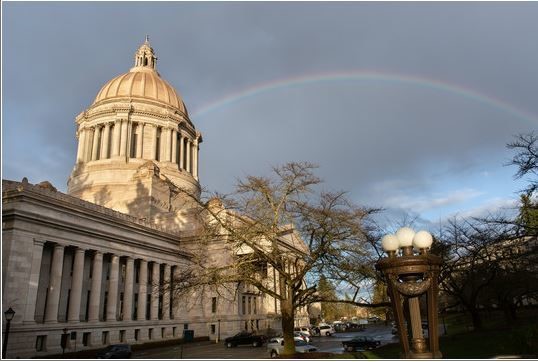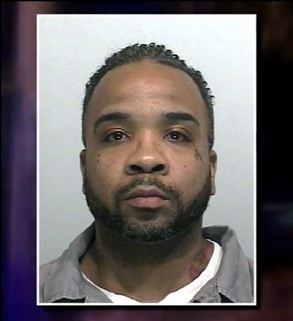Note: The following e-newsletter was sent to Sen. Padden’s subscribers Oct. 5, 2022. To subscribe to Sen. Padden’s newsletter, click here.
Habitual criminal got life-without-parole after bloody car crash, now eligible for release
Last week we saw what happens when the Legislature makes a point of weakening law enforcement and criminal justice. Robert Jackson could be getting out of prison after all.
This isn’t the first time we have heard of him. In 2016 he was the human face of mismanagement at the state Department of Corrections, when he was released from prison four months ahead of schedule and promptly killed his girlfriend in a drunken car crash. His conviction for vehicular homicide was his third conviction for a serious crime, so he was sentenced to life without parole under Washington’s “Three Strikes” law.
The story should have ended there. Last week, as the result of legislation to remove second-degree robbery as a qualifying strike for a life sentence, Jackson was resentenced to 33 years – and eventually he will be eligible for parole and release. While Jackson still may be behind bars for some time, it is hard for us to imagine the anguish and new trauma suffered by the family of his victim, Lindsay Hill. Her relatives were forced to go to court another time to argue for a suitable sentence, for a crime that never would have happened but for the state’s incompetence.
I’ll tell you more about this case this week, and a few other important developments in the world of Olympia and state government. The Legislature is not in session right now – we’ll be coming back in January for our 2023 session. We’re interested in hearing what you think, and we hope you’ll stay in touch.
Best Regards,
Senator Mike Padden
Shorter sentences for lifers take the bite out of life-without-parole
Legislature deliberately weakens Washington’s Three Strikes law, centerpiece of voter-approved reforms
Washington voters were sick and tired of the revolving door at our state’s prisons back in 1993 when they overwhelmingly approved Initiative 593, better known as Three Strikes You’re Out. The first modern three-time loser law, Washington’s Three Strikes law imposed life-without-parole for offenders convicted of a third serious felony, and launched a wave of similar legislation in other states. It was a sea-change in our approach to crime, after years of indifference to crime victims and their families. Some felons just don’t get the message, and Washington voters said it was time to get tough.
Three Strikes and other reforms played a major role in tamping down crime rates over the next few decades. Unfortunately, some in the Legislature saw the solution as a problem.
When control of the Legislature shifted to our urban colleagues in 2018, they quickly got to work. They have passed 17 bills that reduce sentences, eliminate criminal penalties and facilitate mass releases from our state prisons. They include Senate Bill 5164 (2021), sponsored by Sen. Jeannie Darneille, D-Tacoma, which removed second-degree robbery as a three-strikes conviction. Over objections from our side of the aisle, the bill was made retroactive. This was no bloodless, technical revision to the law – we knew this change would shorten sentences for about 100 people who were supposed to spend their lives behind bars. Robert Jackson was one of them.
Let us remember what Jackson did. Drunk and driving fast, he smacked into a Bellevue utility box at such high speed that passenger Lindsay Hill was thrown through the windshield and died of catastrophic head injuries. Jackson was arrested when a witness reported a blood-soaked man wandering through a nearby apartment complex. Hill’s 13-year-old son discovered his mother’s dead body.
If only this was a unique case. In Vancouver, a man sentenced to life-without-parole after killing a 14-year-old girl is poised to receive a reduced sentence for the same reason. The case of Roy Russell is significant because he was awarded a Three Strikes life sentence in 1998 and walked free due to a technicality in 2001, giving him the opportunity to murder teen-ager Chelsea Harrison in 2004. Our Three Strikes law was written for people like Jackson and Russell. I hope the legislators who voted for SB 5164 will be able to explain why it was so important to give them a chance to walk free, and why they thought the voters should be overruled.
On the air
Audio: Listen to Sen. Padden discuss the Jackson case on Seattle’s KIRO-FM, with host Dori Monson.
Museum offers look at Valley Heritage
 Last month it was my pleasure to tour the Spokane Valley Heritage Museum – a reminder of our smalltown agricultural heritage in the region between the Spokane city limits and the Idaho border. Housed in the old Opportunity Township Hall at 12114 East Sprague, the museum hosts exhibits, regular programs, and an extensive online photo archive. I enjoyed visiting with Jayne Singleton (above), the museum’s founder and executive director. If you haven’t seen the museum before, it’s worth a visit.
Last month it was my pleasure to tour the Spokane Valley Heritage Museum – a reminder of our smalltown agricultural heritage in the region between the Spokane city limits and the Idaho border. Housed in the old Opportunity Township Hall at 12114 East Sprague, the museum hosts exhibits, regular programs, and an extensive online photo archive. I enjoyed visiting with Jayne Singleton (above), the museum’s founder and executive director. If you haven’t seen the museum before, it’s worth a visit.
Our COVID emergency to end, will reform effort follow?
 At long last, Gov. Jay Inslee has decided he can relinquish the emergency powers that have allowed him to call the shots during the COVID crisis these last two-and-a-half years. He says he will end the emergency Oct. 31 – and it’s about time. It’s been a year since anyone would have described the situation as an emergency. Yet even as other states were ending their emergency declarations, our governor was using it as an excuse to fire thousands of state employees who objected to his heavy-handed vaccination order.
At long last, Gov. Jay Inslee has decided he can relinquish the emergency powers that have allowed him to call the shots during the COVID crisis these last two-and-a-half years. He says he will end the emergency Oct. 31 – and it’s about time. It’s been a year since anyone would have described the situation as an emergency. Yet even as other states were ending their emergency declarations, our governor was using it as an excuse to fire thousands of state employees who objected to his heavy-handed vaccination order.
Most other states set time limits on emergencies, and force the Legislature’s involvement if an emergency is to be extended. Ours lets the governor decide when an emergency is over. This one will have run an astounding 975 days when it ends on Halloween. We learned what happens when the governor thinks he knows best and the Legislature is too timid to challenge him. Partisan politics prevented the Legislature from considering meaningful reform while the emergency was in force, but we can expect debate on this issue next year. Let us hope the end of the emergency permits a rational discussion of the issue.
Time to relax COVID rules for border crossings
Speaking of COVID rules, Canada has relaxed its requirement that all who cross the border must be vaccinated. So when will the U.S. follow suit? Two members of Congress from Eastern Washington are urging the Biden Administration to drop all vaccine requirement for people entering the U.S. from Canada. Smooth border crossings are clearly a concern not just for the feds but state government as well. This story from The Center Square tells us more.
What we didn’t learn from the Department of Corrections
14 prisoner deaths from COVID – six following inadequate treatment
Joe O’Sullivan, formerly of the Seattle Times, has written a follow-up to his piece in Crosscut two months ago about the Department of Corrections. This one is worth a read. His last piece revealed that a half-dozen critical reports from an official prison watchdog agency had apparently been shelved under new management. In this latest piece, he has obtained a draft version of one of those reports from the Office of Corrections Ombuds – and it is an eye-opener. Of 14 prisoners who died of COVID, the report says six were inadequately evaluated, and in five cases no doctor was called, despite the appearance of COVID symptoms. At this point it isn’t clear what DOC is doing about it, or if the report even will see a formal release.
California energy shortages drive up prices in Washington
Another reason Washington should not tie energy policies to California
Todd Myers makes an interesting point in the Washington Policy Center blog. We pay for California’s mismanagement. Irresponsible energy policies leave the Golden State short of power when the sun isn’t shining and the wind isn’t blowing. On Sept. 6, California was buying our region’s power after dark for $1,200 a MW/hour. That drove up prices for Washington utilities, too. Myers writes, “Gov. Inslee recently said he wants to integrate our climate policy more closely with California. Like electricity prices, the result is likely to be that Washington residents will pay for decisions being made by California legislators. …We need to ensure we have adequate resources so we don’t get left holding the bag when California is short.”
Contact us!
If you have a question or concern about state government, please do not hesitate to contact our office. During the interim we are conducting business from our district office in Spokane Valley. We are here to serve you!
Phone: (509) 921-2460
District Office: 5105 E 3rd Ave, Ste 102 Spokane Valley, WA 99212
Email address: Mike.Padden@leg.wa.gov
PLEASE NOTE: Any email or documents you provide to this office may be subject to disclosure under RCW 42.56. If you would prefer to communicate by phone, please contact Sen. Padden’s Olympia office, which will be open starting Jan. 6, at (360) 786-7606.
To request public records from Sen. Padden, please contact Randi Stratton, the designated public records officer for the Secretary of the Senate and Senate members.













